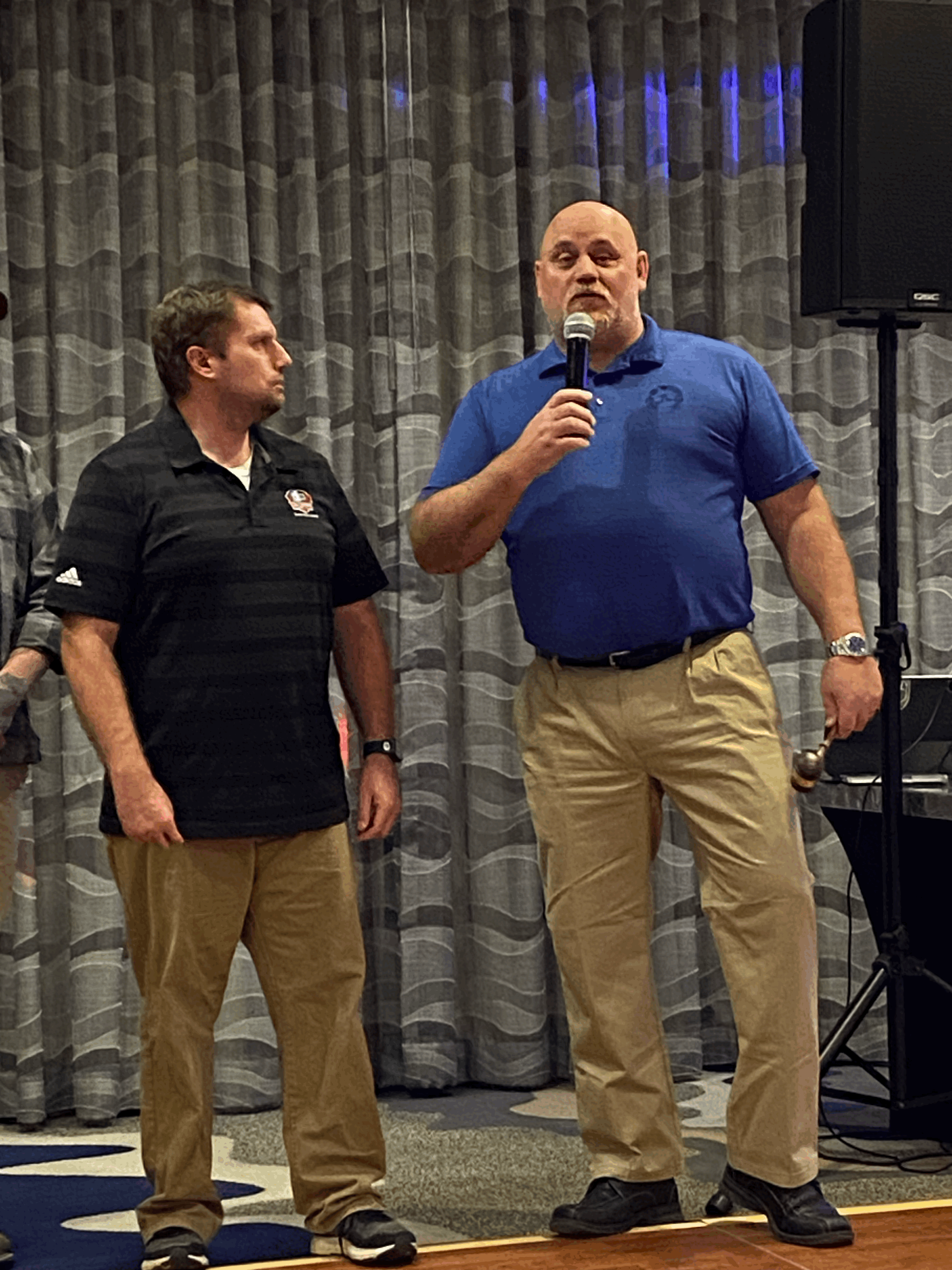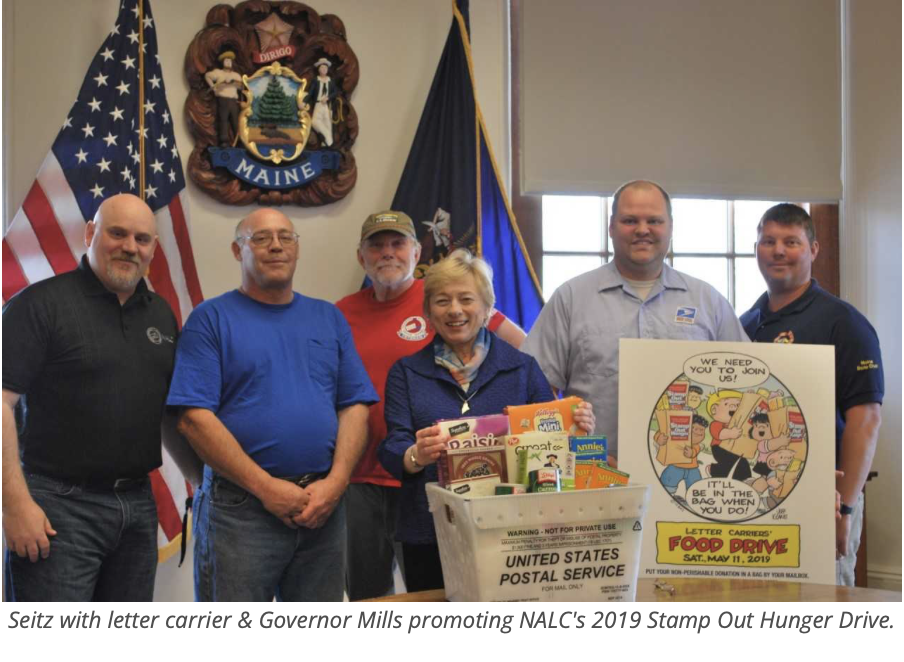NALC President Mark Seitz Leaves Postal Service, Reflects on Time in the Labor Movement

PHOTO: Mark Seitz at an NALC 92 rally in Portland in December, 2022
Longtime National Association of Letter Carriers (NALC) Branch 92 President Mark Seitz has stepped down as President to take a job at Portsmouth Naval Shipyard. Seitz cited a number of reasons for his departure, but the deciding factor was that the job was becoming too physically demanding.
“My body is breaking down,” he said. “I already had one hip replacement and both my knees and my other hip have to be replaced. I carried probably two, maybe three days a week and I’d do union work the rest of the time. I would just hurt at night after carrying and I was only working eight hours. I can’t imagine how these people feel working fourteen-hour days.”
However, Seitz said that he’ll always be a union person and has informed the national union that he would like to be reinstated when he retires in seven years. Since both the USPS and the Portsmouth Naval Shipyard are federal employers, the new job allows him to keep his vacation time, sick time and retirement in the transition to his new Job.
Originally from Boston, Seitz began his career working as a bouncer, barbacker and bartender at a bar in Faneuil Hall. While working at the bar, he took a second gig working at a wholesale produce warehouse clocking around a hundred hours a week. Then in 2003, his wife picked up a postal service application and applied for him.
“She said, ‘hey, I think this is a good job. I’m going to put your application in. “So I said, ‘ok,’" he recalled.
At the time, Seitz was one of 3500 people who took the entrance exam in Boston to apply for the postal service and ended up being one of the first one hundred hired off the register. He started the job in December of 2003. When a union representative came to do a presentation for the new hires, Seitz was already sold. His father and uncle filled ending machines and were active union members.
“When they came into to do their organizing talk for me, I was like ‘well why wouldn’t anybody join the union? This is good for everybody.’ I signed up right away,” he said. “For a few bucks a week? The only reason you’re making that money is because of the union.”
A few years later, his love for his union solidified when he was about to transfer from Boston to the Portland office. He had the moving truck all packed up when management told him they put a hold on him for 60 days. Seitz’s shop steward, who now happens to lead the Boston area NALC local, got the 60-day hold waived. After Seitz started as a part-time carrier in Portland in 2005, he began attending union meetings and when he became a full-timer a year later, he was asked to become a union steward.
“I said ‘I don’t really know a lot yet, but I’m very interested in helping out and doing whatever I need to do so they made me an alternate steward,” Seitz recalled. “After a week, they said, ‘well we know you haven’t been trained but we’re just going to make you a full steward.’”
In 2007, he became a trustee and then Secretary Treasurer of the union two years later. After six years, he became branch president. One of things he tries to explain to people unfamiliar with unions is that they are obligated to defend everybody, regardless of whether the worker did something wrong or whether they personally like the individual.
“The contract has to be upheld and you’ve got to hold management accountable for everything,” he said. “If someone did something wrong and management didn’t follow the process and you got them off, that’s going to benefit everybody going down the line. You’ve got to set an example.”
Although the post office is an open shop, NALC Region 14, which comprises New England has the highest percentage of union members in the nation. Branch 92 currently has a 98.5 percent membership rate thanks to excellent organizers like Seitz, current NALC 92 President John Graham, retired Waterville mail carrier Chuck Webber and Jon Brackett.
Automation, Surveillance & Other Challenges Facing Letter Carriers

Since Seitz started working as a mail carrier more than twenty years ago, the postal service has made a lot of changes that have made the work more challenging. Seitz noted that mail carriers used to spend four or five hours in the office sorting mail for their route, but now with increased automation, machines do that work. Now carriers only spend one to two hours in the office and the rest of the time delivering mail.
"It’s definitely more of a physically demanding job,” said Seitz. “And with the post office being more short-handed and there being more forced overtime, instead of being out on the street for four hours at the beginning, now you’re out on the street six, eight, nine, ten hours.”
Seitz says the number of injuries to hips, knees and shoulders among mail carriers has dramatically increased since more advanced mail sorting technology has been deployed. In the last six years management has also started to use scanners with GPS tracking to determine where each mail carrier is and how long they spend working at a specific task.
“There is just so much micromanaging and questioning,” said Seitz. “If we get a ten-minute break, management is constantly asking people, ‘hey, it looks like you stood still for eleven minutes. What happened?’ If you take a 31-minute lunch, they’ll ask ‘what were you doing? Were you taking lunch for 31 minutes?’”
He said instead of going out in the street to see what's happening, management has people who sit at computers to surveil letter carriers all day to find out whether they are “stationary” for longer than we should be based on where we are.
At the same time, new hires are making less and getting fewer benefits than when Seitz started working for the postal service thanks to a two-tier system imposed by an arbitrator in 2013. The decision came after the other crafts had negotiated their contracts and accepted the tier systems.
Potential Improvements on the Horizon

NALC and the Postal Service have been in contract negations for over a year now and the current contract expired in May of 2023. In March the two parties selected Arbitrator Dennis R. Nolan to serve as the neutral chair of a three-person arbitration panel to set the terms for a new national agreement between the union and management. Details are sparse as NALC keeps its cards close to its chest, but more and more NALC locals are demanding a more open bargaining process.
Seitz says the union is in a much better position after it helped push passage of the bipartisan Postal Service Reform Act of 2022 (H.R. 3076), which will finally put the US Postal Service on a path toward financial stability. The measure repealed the onerous and financially debilitating pre-funding retiree healthcare and pension mandate created by the 2006 Postal Accountability and Enhancement Act (PAEA), which caused the USPS to lose billions of dollars.
“We were the first union to negotiate after that bill was passed as all of the other postal unions had negotiated,” Seitz said. “We basically helped them pass that law, so they're in a much better position than they were, which will benefit us.”
He said that he is hearing that union leaders could negotiate an elimination of the two-tier system or substantially shorten the length of time it takes to go from a non-career to a career employee.
Seitz stresses to members that elections matter this fall because Congress has the power to reduce their vacations and retirement. In 2005, the federal government increased the share workers had to pay into their retirement from .9 percent to 2.9 percent and then 3.5 percent a few years later. NALC is also hoping to elect enough pro-labor members of Congress to pass a bill that would allow mail carriers to buy back their non-career time and have it count towards retirement. Veterans currently have a similar benefit that allows them to buy back military time.
Meanwhile, Seitz says that although he is no longer a union member, he still remains strongly supportive of workers' rights. As he tells new employees at the shipyard, “Listen, I may not be in the union now, but the union is there for you and I urge everyone to join the union and get involved.”
